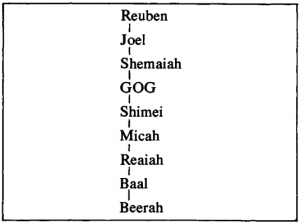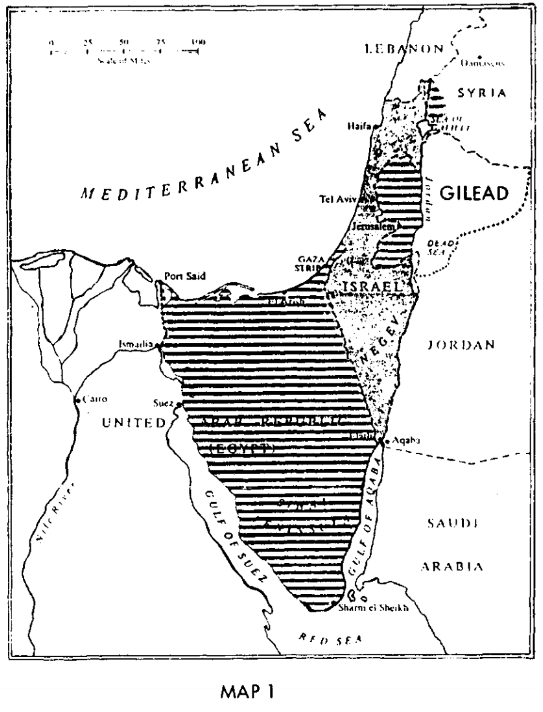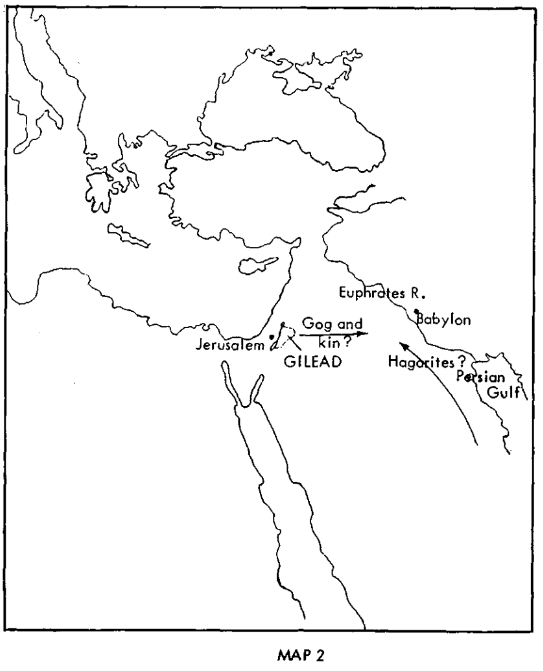Ezekiel’s Reference to Gog1 in chapter 38 is something of a Bible mystery. Ezekiel’s Divine message is addressed to Gog, one of the indications that Gog is a pre-eminent identity among Israel’s antagonists. It is essential therefore that we attempt to find a credible application for this name, and so much the better if it be a Biblical one.
All of the other ancient names in the chapter have their origins in Genesis as grandsons or great-grandsons of Noah. As such they have Biblical roots and are pre-Jewish. This description, pre-Jewish, is more appropriate than the term ‘Gentile’, when it is recognised that the words ‘Jew’ and ‘Gentile’ are not appropriate until Israel became a historic reality.
Genesis 10:2 informs us that Magog is a son of Japheth, and here, surely, we have the roots of the name Gog. Incidentally, it is sometimes held that Hebrew has no equivalent of English vowels, and this can lead to the misunderstanding that Gog and Agag, both reduced to Gg, are indistinguishable. In Hebrew, Agag is always preceded by the aleph, while Gog is not. In addition, the two ‘ g’ s in Gog are separated by vav, which does not occur in Agag. Hence aleph and vav serve as a kind of vowel equivalent, and the two names are quite separately identifiable. The substitution of Gog for Agag in the Septuagint of Numbers 24:7 appears to be unwarranted human tampering with the text.
The first occurrence of the name Gog is in 1 Chronicles 5:4, among the descendants of Reuben. The chronicler does not specify the relationship between Reuben and Joel, but the accompanying chart assumes that Joel was a son of Reuben (he may well have been a grandson).
The chapter tells us that the last in line was taken captive to Assyria by Tiglath-pileser ( v. 6). Thus both ends of the line can be dated accurately, and Gog’s period, being just earlier than halfway, may be estimated to be in the time of the Judges. The name Gog legitimately may be regarded as a Bible name like the others in Ezekiel 38, with a similar origin but belonging to a later period.

Verses 7 and 8 list another series of families arising out of Joel’s sons. In fact, this chapter’s summary of Reuben’s descendants is largely that of Joel’s family, and Beerah is called a “leader of the Reubenites” ( v. 6, NIV). Gog appears in a line of very influential Reubenites and, if contemporary with Azaz in the other branch of verse 8, he was one of the two leaders of his generation of Reubenites. It is therefore extremely likely that Gog would be well remembered in Ezekiel’s generation. Ezekiel was not naming some obscure personage, but highlighting the characteristics of a well-known and prominent Jew of bygone times.
But what characteristics? And of what reputation?
The Bible merely provides hints of what the family was like based on the scraps of information in verses 9 and 10 of! Chronicles 5. Further guidance is provided by modern Gog when account is taken of the character of the Jews who formed the backbone of the 1917 Russian Revolution. Like so much of the rest of Bible prophecy, the secrets of Gog are only grudgingly and hesitantly revealed when viewed from both ends of history with the Bible record given priority in the supply of facts.
Cattle kings and land
Reuben, along with Gad and half of Manasseh, was allocated land on the east of Jordan. Reuben’s portion was in Gilead, level with the north half of the Dead Sea and opposite to, that is, east of Jerusalem. Joshua 13:15-23 generally describes this area as “all the kingdom of Sihon king of the Amorites” (v. 21) with an imprecise east border. It particularly appealed to these tribes because it was good cattle country and they had much cattle (see Map 1).

Thus also is described Gog’s line: they were cattle kings. Thus also is described one of the reasons for Gog’s latter-day invasion: “I will go up to the land of unwalled villages . . . which have gotten cattle and goods” (Ezek. 38:11,12). The issue of cattle is a key thread throughout Gog’s record.
The expansion of the cattle empire of Gog’s line proceeded at such a pace that “eastward he inhabited unto the entering in of the wilderness from the river Euphrates: because their cattle were multiplied in the land of Gilead” (1 Chron. 5:9).
It is difficult to assess how far east from Gilead towards the Euphrates it was then possible to graze cattle. The topography was very different from today; for example, lions roamed far afield. Although sometimes translated “desert”, the word “wilderness” may mean an uninhabited place, as Gesenius makes clear. In 1 Samuel 17:28 the wilderness is the grazing grounds for sheep. East of Jordan is now largely desert, but in Gog’s time grazing lands were much more extensive.
Five hundred miles along a line drawn east from Jerusalem through Gilead lies Babylon, just across the Euphrates. How far out in this direction would Gog and his kin keep their cattle? Babylon may well have been his closest big market. What northerly diversion would be necessary to negotiate the difficult centre and reach such a marketplace?
1 Chronicles 5:10 adds this fact about Gog’s line: “in the days of Saul they made war with the Hagarites, who fell by their hand: and they dwelt in their tents throughout all the east land of Gilead”. The Hebrew of this last phrase is “upon all the face of the east of Gilead”. They were masters of all the country east of Gilead to the boundaries of civilisation.
The Hagarite origins of the people with whom the Gog line fought offer no geographic clues, but Gesenius traced them to the Persian Gulf area. It seems that they had moved north on the Arabian side of the Euphrates, had collided with Gog’s kin and had been defeated. The Bible simply records the fact that these Reubenites dwelt east of Gilead without specifying how far east. As Gilead marked the boundary of the promised land, the Gog line of cattle kings east of there were living outside the limits of Israel (see Map 2).

Gog’s character
With the aforegoing combination of Bible information, technical commentary and deduction, an assessment of the character and reputation of Gog and his line may be attempted.
They were bold and fierce men, not afraid of a challenge or a fight They were highly successful in the cattle business and dominated large tracts of sparsely populated lands to the east. They were leaders in Reuben and had achieved an unusual victory over one of Israel’s Arab enemies. For these reasons alone, Gog and his line would be well remembered in Ezekiel’s time.
But more than that. They were rogue Jews, living outside the borders of Israel. They were outside the civil administration of the nation except, perhaps, in Solomon’s time. They were responsible for their own safety and quite capable of maintaining it. One can imagine what a hard time the taxman would have had out there.
They were also well outside the jurisdiction of the priests. It would be a long way to the temple in Jerusalem, difficult indeed to comply with observances of the law, many of which required proximity to, or regular visits to, Jerusalem. How were the tithes to be paid way out there? Can we expect a willingness to comply?
Gog and his line were fringe people. In the Assyrian onslaught they would be the first to be taken off into northern darkness. They were Jews in name only. If it be thought that this is a harsh judgement, then look at the modern equivalent and be guided.
There can be no doubt that Ezekiel was directing his audience, both then and now, to the latter-day threat of an invasion of Israel from the tribal lands of southern Russia and eastern Turkey. That was the geographical location of Magog, Meshech, Tubal, Gomer and Togarmah. Ezekiel’s contemporaries knew them and their lands well. We are still directed there today.
Gog, however, was different. He was not a near descendant of Noah; the others were. He had no tribal lands in his own name. Their names were used to pinpoint a geographic location (despite attempts by some to spread them half way across the globe). Gog’s name was invoked to signify that his well-remembered characteristics, personality and attributes would also be the marks of those who would be responsible for the roots of the latter-day invader. Their names foretold where the invasion on the mountains of Israel would originate. Gog’s name foretold the treasonable crime which would make it possible.
Gog in modern Russia
Modern Russia arose out of the Russian Revolution of 1917. That revolution was engineered by Jews. The lists of Jewish names associated with the socialist, radical movement which took over Czarist Russia is astounding. These Jews were political people, intent on using Russia as the centre of a worldwide utopian movement. The Jewish religion meant nothing to them. Zionism was anathema. The restoration of Israel was a threat to their purpose.
They were Jews in name only. They existed quite apart from those many Jews in Russia who were Zionist. Their religious heritage was abrogated by their atheism. They had no Jewish cultural contact They were fringe Jews and worse. They became kings in their own trade, not afraid of a challenge or of a fight. They were rough, tough, ruthless.
All the top names of the Russian Revolution were Jews or of Jewish origin. Karl Marx was a Jew. Lenin’s mother was a Jewess. Engels was a Jew. Trotsky’s name was Davidovich Lev Bernstein before his embarrassment induced him to change it. Many changed their names to hide their Jewishness. Stalin spoke Yiddish and had a Jewish wife.
Of the twelve members of the Central Committee of the Bolshevik Party which took over Russia, nine were Jews and at least one other was married to a Jewess. Of 61 Central Committee members of other parties in collaboration, 55 were Jews. In 1920, of the top 545 members of the Bolshevist administration, 447 were Jews.
The Times of March 29, 1919 remarked that no less than 75 per cent of the central machinery of the Bolshevist movement were Jews. Around this time the population of Russia was given as 158,400,000, the Jewish section being around 7,800,000. Yet over one third of the Jews in Russia had become officials, a figure grossly out of proportion.
The preponderance of Jewish influence in early twentieth-century Russia was due to the tides of Jewish European migration. Over the centuries they had been driven first north from the Mediterranean area and then east, finally to
congregate in Poland. Russia annexed the eastern half of Poland in the nineteenth century and gained five million Jews in one swoop. An enormous ghetto called the Pale was established, but, in the course of time, many Jews established themselves in Russia outside the Pale. The Jews were the thinkers, the intellectuals. It was a natural course of events that, in repressed and ignorant Russia, some Jews should seize the initiative when given the opportunity.
Other Jews in Russia were not of that sort at all. They were proud of their Jewish background and were intensely interested in Theodor Hertzr s proposal for a Jewish State in Israel. They attended their synagogue on the Sabbath, observed Yom Kippur and repeated “Next year in Jerusalem”. But there were Jews in Russia like Gog, not really interested in those things at all but attracted to the market places of Babylon, through the wilderness on the Euphrates or at least its modern equivalent in Europe and elsewhere.
The Defender of Wichita, Kansas, of February 1936 reported that the Central Committee of the Communist Party in Moscow was comprised of 59 members, 56 of whom were Jews and the other three were married to Jewesses (list of names supplied). More recent information is difficult to obtain, partly because Jewish origins were suppressed and became obscured with time. We may never know the current extent of continued Jewish influence in the Russian administration.
To Bible scholars the Jewish intrusion in the modern Russian State is nothing short of astounding. The domination of Jewish personalities in the revolution and its aftermath may be partially understood by the preponderance of the Jewish intelligentsia in an illiterate and repressed country, but we have long recognised that such things are not accidents of history. God’s work with his chosen people, wherever they may be, is deliberate and purposeful.
The proposition in this article is that God foretold the Jewish formative role in the resurgence of Russia in the latter days through the invocation of Gog’s name in Ezekiel’s prophecy in chapter 38. Ezekiel’s contemporaries would be able to form an impression of the character of the latter-day invaders because they would be familiar with the self-seeking, domineering, godless Reubenites of the eastern wilderness.
The Jewishness of the 1917 Russian Revolution was unknown to our early pioneers and has become blurred with the passage of the past 69 years. Russia now has little if any resemblance to rebellious Reubenites, but we do well to remember that the Soviet monster of today is the product of latter-day Jewish ingenuity and influence. When Gog descends upon the mountains of Israel he does not need to wave Reuben’s standard to exhibit the characteristics of his atheistic, socialist, faithless, self-seeking Jewish forebears of 1917. And their roots are grounded in the barren fields east of Gilead—they never lost their yearning for a healthy herd of cattle.
There is a 3,000-year fateful circle which is not yet quite closed. After banishment to northern Assyrian darkness for 27 centuries, Gog is about to try to come home, without realising that it is home. He is not coming in response to God’s call, as millions of his brethren have done and will yet do. He does not hear the summons of Abraham’s promise or Israel’s hope or David’s kingdom or even of Jesus’s gospel.
He is not motivated by race, creed, kinship, brotherhood, or history. He is not that stamp of person at all. We had a brief glimpse of him—grasping, big dealer, fighter, go-getter, uncaring, unfaithful. When he attempts to come home, he does so displaying all those characteristics. He wants cattle, goods, a prey, quick gain, silver, gold— and all in unwalled villages. Easy pickings! It is just too much for Gog to resist, and he is not the slightest bit concerned that, to get it all, he is to do violence to his brothers, his kinsfolk, God’s people. Ah, but that was too long ago—it means nothing to him now.
What a powerful exhortation on the dangers of being fringe people! It can lead to treason. Gog is all but destroyed so close to the fields where it all began so long ago.
Postscript
This proposition is capable of further development. One avenue of particular interest is the possibility of God employing Jews in other revolutions of great importance. For example, the Jacobin party was a key element in the French Revolution which broke the despotic power of the Catholic Church. A party whose name was so closely associated with that of the patriarch Jacob is very likely to have had Jewish connections, and some historians have attempted to discredit Jewry by hinting at Jewish plots in 1790.
It may be possible to identify a hitherto unsuspected work of God with Jews if a decisive Jewish role in the French Revolution could be paralleled to that of 1917. The writer would be delighted to correspond with any who could document such Jewish activity connected with the French Revolution. Please make contact at 6 Booyong Avenue, Lugarno 2210, NSW, Australia.
